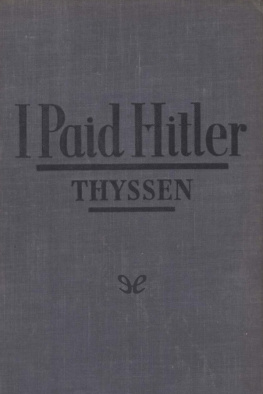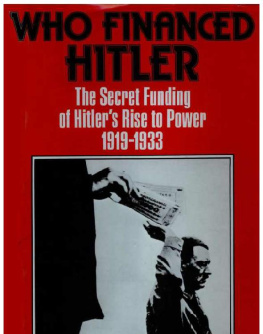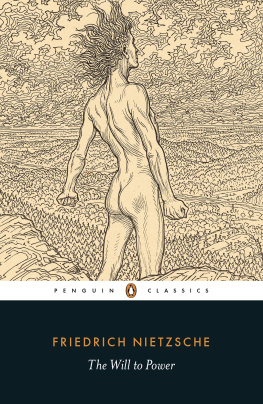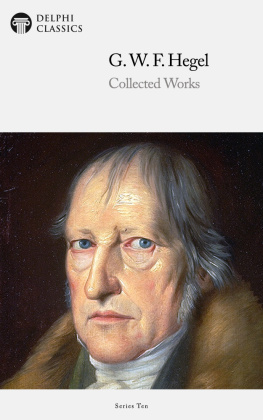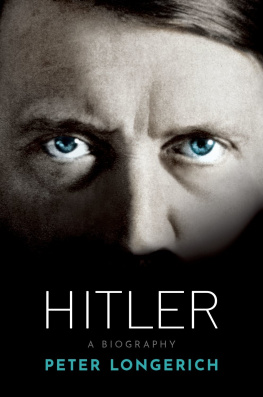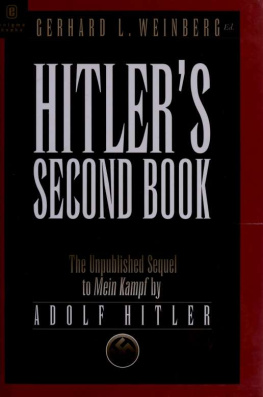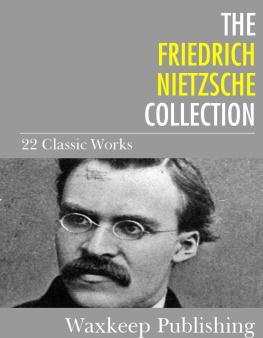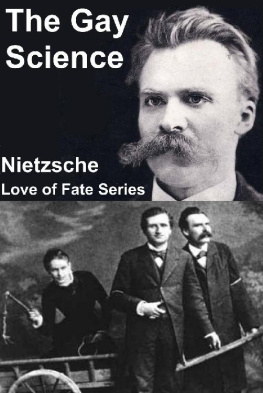Friedrich Thyssen - I paid Hitler
Here you can read online Friedrich Thyssen - I paid Hitler full text of the book (entire story) in english for free. Download pdf and epub, get meaning, cover and reviews about this ebook. year: 1941, publisher: ePubLibre, genre: Science. Description of the work, (preface) as well as reviews are available. Best literature library LitArk.com created for fans of good reading and offers a wide selection of genres:
Romance novel
Science fiction
Adventure
Detective
Science
History
Home and family
Prose
Art
Politics
Computer
Non-fiction
Religion
Business
Children
Humor
Choose a favorite category and find really read worthwhile books. Enjoy immersion in the world of imagination, feel the emotions of the characters or learn something new for yourself, make an fascinating discovery.
- Book:I paid Hitler
- Author:
- Publisher:ePubLibre
- Genre:
- Year:1941
- Rating:5 / 5
- Favourites:Add to favourites
- Your mark:
- 100
- 1
- 2
- 3
- 4
- 5
I paid Hitler: summary, description and annotation
We offer to read an annotation, description, summary or preface (depends on what the author of the book "I paid Hitler" wrote himself). If you haven't found the necessary information about the book — write in the comments, we will try to find it.
I paid Hitler — read online for free the complete book (whole text) full work
Below is the text of the book, divided by pages. System saving the place of the last page read, allows you to conveniently read the book "I paid Hitler" online for free, without having to search again every time where you left off. Put a bookmark, and you can go to the page where you finished reading at any time.
Font size:
Interval:
Bookmark:
T HIS extraordinary book has an extraordinary story. And this story must be told.
When, at the outbreak of the war in September, 1939, Fritz Thyssen, the great German industrialist, fled from Germany to Switzerland, almost all the newspapers, magazines, syndicates, and publishers of the world tried to obtain his memoirs, or at least the true story of his rupture with Hitler and his escape from Nazi Germany.
The story of the man who was the greatest industrial power in Germany, who was an ardent German nationalist, who organised the passive resistance in the Ruhr in 1923; the man who for more than fifteen years backed Hitler and financed his movement the story of the great German capitalist who helped the Nazis into power because he believed that they were the people who could save his country from Bolshevism and who have now confiscated all his property this is indeed one of the most unusual stories of this world crisis.
In this great competition among publishers to obtain Thyssens memoirs, I have taken part myself and it happened to be that I won. I should like to tell in a few lines, why and how.
During the past ten years I have directed, in Paris, an international newspaper syndicate called COOPERATION. The programme of this organisation was to unite the leading international statesmen and to publish their views on international affairs all over the world. My first contributors were Lord Cecil, Sir Austen Chamberlain, Arthur Henderson, Paul Painlev, Louis Loucheur, Henri de Jouvenel, and some others. As the organisation grew in the years before the war, it obtained an almost monopolistic position in handling the exclusive world rights of the articles of about a hundred leading statesmen such as Winston Churchill, Anthony Eden, Alfred Duff Cooper, Lord Samuel, Major Attlee, Hugh Dalton, Paul Reynaud, Edouard Herriot, Leon Blum, P. E. Flandin, Yvon Delbos, and many others from England, France, Spain, Belgium, Scandinavia, and the Balkans. These articles, issued almost daily, have been printed all over the world in some four hundred newspapers in about seventy countries. The American public may recall these articles published before the war in the United States by a group of over twenty leading independent newspapers from coast to coast, headed by the New York Herald Tribune.
I have tried to present all the conflicting views of Europe and have often published also the articles of the Fascist spokesman, Virginio Gayda, inasmuch as it was possible for us to print also from time to time foreign articles in Italian newspapers. But I have never published Nazi articles. In fact, as the crisis grew, the policy of my organisation became more and more openly anti-Nazi until it was probably the only organisation of this kind fighting Nazi influence and the Goebbels machine on the European continent. These publications must have had some effect, as one day I received the highest tribute from Hitler himself when, in his first speech after the Munich agreement at Saarbrcken, he shouted hysterically that this propaganda by Churchill, Eden and Duff Cooper must stop.
I am obliged to mention this because in connection with the Thyssen memoirs I shall have to make a few statements which, under the circumstances, can be proved only by my past record.
When Thyssen arrived in Locarno he was unable to reply to any request for publication because he had given his word of honour to the Swiss government that, while residing in Swiss territory, he would refrain from any declaration or publication. Consequently, I did not think it would be of any use to go to see him myself and I therefore tried to approach him through various friends. I received no encouragement whatsoever. In March, 1940, Thyssen went from Switzerland to Brussels to visit his dying mother and I learned that from Brussels he would go to Paris.
On the 3rd of April, I received in my office in Paris a telephone call from the Sunday Express in London and the Paris Soir, newspapers with whom I have long had business relations, saying that they had been doing their utmost to obtain the story of Mr. Thyssen but were unable to approach him. They asked me whether I could help them.
I immediately went to see M. Paul Reynaud who was Minister of Foreign Affairs as well as Premier. I explained to him the political importance of the publication of Thyssens memoirs and he emphatically agreed with me. The problem was how to persuade Thyssen to write and publish without further delay. I told M. Reynaud that I knew the man who could introduce me to Thyssen and who could probably persuade him to entrust the publication of his memoirs to me. Unfortunately, this man, who was a friend of Thyssen, was in London and it was extremely difficult in view of the existing censorship and prohibition of international telephone calls to put him in touch with Thyssen. M. Reynaud instructed one of his attaches to help me and permitted me to use the telephone line of the Quai dOrsay to the French Embassy building in London.
I spent a most dramatic day and almost a whole night in the attaches room at the Quai dOrsay. I left M. Reynauds cabinet at about the same time as the Paris-Brussels Express on which Thyssen was to travel left Brussels. As we did not know where Thyssen was staying in Paris, the Sret was charged to report his movements. We received about halfhourly messages: Thyssen crossed the frontier, Thyssen passed St. Quentin, Thyssen arrived at the Gare du Nord, and finally, Mr. and Mrs. Thyssen arrived at the Crillon Hotel.
I immediately attempted to arrange a telephone communication between Thyssen and our mutual friend in London, but it took almost twenty-four hours before we succeeded. Finally they were both on the telephone, talking without censorship interference on the official line of the French Foreign Ministry for about half an hour. The following day I received a note from Mr. Thyssen asking me to come and see him at the Crillon.
Our first meeting was very cordial and lasted almost two hours. He said that he was prepared to publish immediately the letters which he addressed to Hitler, Goering, and other officials after his rupture with the Nazis and in which he explained why he had left Germany. In fact, he had already sent these letters to a friend of his in America with a view to publishing them. He said he would be glad if these letters could also be printed in England, in France, and in as many other countries as possible, but that he would not like to publish anything more at the moment.
I saw Thyssen every day while he was in Paris. I asked him point-blank, Do you want to help us destroy Hitler or not?. When his reply was an unconditional Yes I tried to make him agree with me that the things he had to say and the documents and material he possessed must be published during the war and not after if they were to produce their full effect. After the third or fourth conversation he came to understand that in the middle of a war against Hitlerism there was no use having powerful weapons in ones possession and withholding them from instant use.
Once he decided to write his memoirs he was most anxious to proceed as quickly as possible. He wanted his letters to be published without delay, even before the completion of his book. These letters appeared in the United States in Life magazine on April 29, 1940. Simultaneously, they were published in London in the Sunday Express, and in France in Paris Soir.
Thyssen was anxious to have some of his papers which he had deposited in the vaults of a bank at Lucerne in Switzerland. I discussed the matter at the Quai dOrsay and they were prepared to send a special diplomatic courier to Lucerne in order to bring the papers to France. After a weeks stay in Paris, Mr. and Mrs. Thyssen left for Monte Carlo. The papers arrived from Switzerland four days later and I went down to the Riviera with a collaborator of mine, who was to help Thyssen in preparing the book, and a secretary. Thyssen was staying at the Hotel de Paris in Monte Carlo. I placed my collaborator near him at the Beau Rivage Hotel, and in order to evade the attention of the innumerable Italian spies who were in that region at that time, I went to stay about ten miles away at the Grand Hotel at Cap Ferrat, which is one of the quietest places in the most charming spot of the Riviera. There were only a few guests in the hotel, among them Sir Nevile Henderson, the former British Ambassador to Germany who, at that time, had just finished writing his book about the failure of his mission in Berlin. Next to the hotel was the villa of former Premier Flandin whom I saw often while I was staying at Cap Ferrat. He was very much interested in the question why Thyssen had become such an enemy of Hitler.
Font size:
Interval:
Bookmark:
Similar books «I paid Hitler»
Look at similar books to I paid Hitler. We have selected literature similar in name and meaning in the hope of providing readers with more options to find new, interesting, not yet read works.
Discussion, reviews of the book I paid Hitler and just readers' own opinions. Leave your comments, write what you think about the work, its meaning or the main characters. Specify what exactly you liked and what you didn't like, and why you think so.

